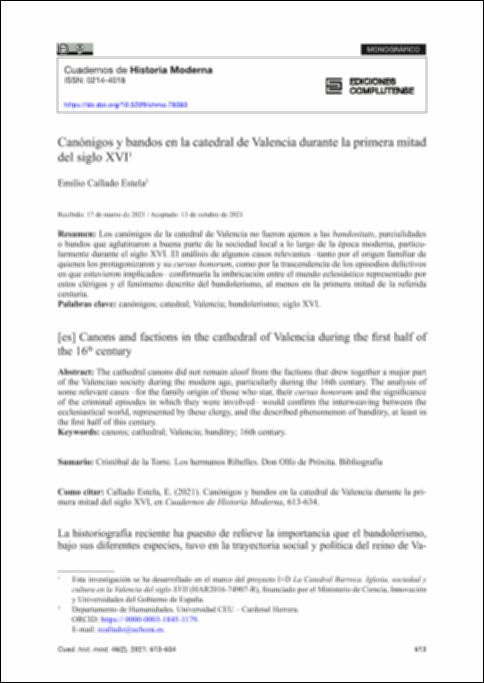Please use this identifier to cite or link to this item:
http://hdl.handle.net/10637/13639Canónigos y bandos en la catedral de Valencia durante la primera mitad del siglo XVI
| Title: | Canónigos y bandos en la catedral de Valencia durante la primera mitad del siglo XVI |
| Other Titles: | Canons and factions in the cathedral of Valencia during the first half of the 16th century |
| Authors : | Callado Estela, Emilio |
| Keywords: | Canons, Cathedral, collegiate, etc. - 16th century - Spain - Valencia (Autonomous Community) - Valencia (County) - Valencia.; Cathedrals - 16th century - Spain - Valencia (Autonomous Community) - Valencia (County) - Valencia.; Brigands and robbers - 16th. century - Valencia (Autonomous Community) - Valencia (County) - Valencia.; Bandoleros - s. 16 - España - Valencia (Comunidad Autónoma) - Valencia (Provincia) - Valencia.; Canónigos - s. 16 - España - Valencia (Comunidad Autónoma) - Valencia (Provincia) - Valencia.; Catedrales - s. 16 - España - Valencia (Comunidad Autónoma) - Valencia (Provincia) - Valencia. |
| Publisher: | Universidad Complutense de Madrid, Facultad de Geografía e Historia, Departamento de Historia Moderna |
| Citation: | Callado Estela, E. (2021). Canónigos y bandos en la catedral de Valencia durante la primera mitad del siglo XVI. Cuadernos de Historia Moderna, vol. 46, i. 2 (14 oct.), pp. 613-633. DOI: https://doi.org/10.5209/chmo.78383 |
| Abstract: | Los canónigos de la catedral de Valencia no fueron ajenos a las bandositats, parcialidades
o bandos que aglutinaron a buena parte de la sociedad local a lo largo de la época moderna, particularmente
durante el siglo XVI. El análisis de algunos casos relevantes –tanto por el origen familiar de
quienes los protagonizaron y su cursus honorum, como por la trascendencia de los episodios delictivos
en que estuvieron implicados– confirmaría la imbricación entre el mundo eclesiástico representado por
estos clérigos y el fenómeno descrito del bandolerismo, al menos en la primera mitad de la referida
centuria. The cathedral canons did not remain aloof from the factions that drew together a major part of the Valencian society during the modern age, particularly during the 16th century. The analysis of some relevant cases –for the family origin of those who star, their cursus honorum and the significance of the criminal episodes in which they were involved– would confirm the interweaving between the ecclesiastical world, represented by these clergy, and the described phenomenon of banditry, at least in the first half of this century. |
| Description: | Este artículo se encuentra disponible en la siguiente URL: https://revistas.ucm.es/index.php/CHMO/article/view/78383/4564456558984 Este artículo pertenece al número que lleva por título "El clero secular ibérico en la Edad Moderna". |
| URI: | http://hdl.handle.net/10637/13639 |
| Rights : | http://creativecommons.org/licenses/by/4.0/deed.es |
| ISSN: | 0214-4018 1988-2475 (Electrónico) |
| Issue Date: | 14-Oct-2021 |
| Center : | Universidad Cardenal Herrera-CEU |
| Appears in Collections: | Dpto. Humanidades |
Items in DSpace are protected by copyright, with all rights reserved, unless otherwise indicated.


